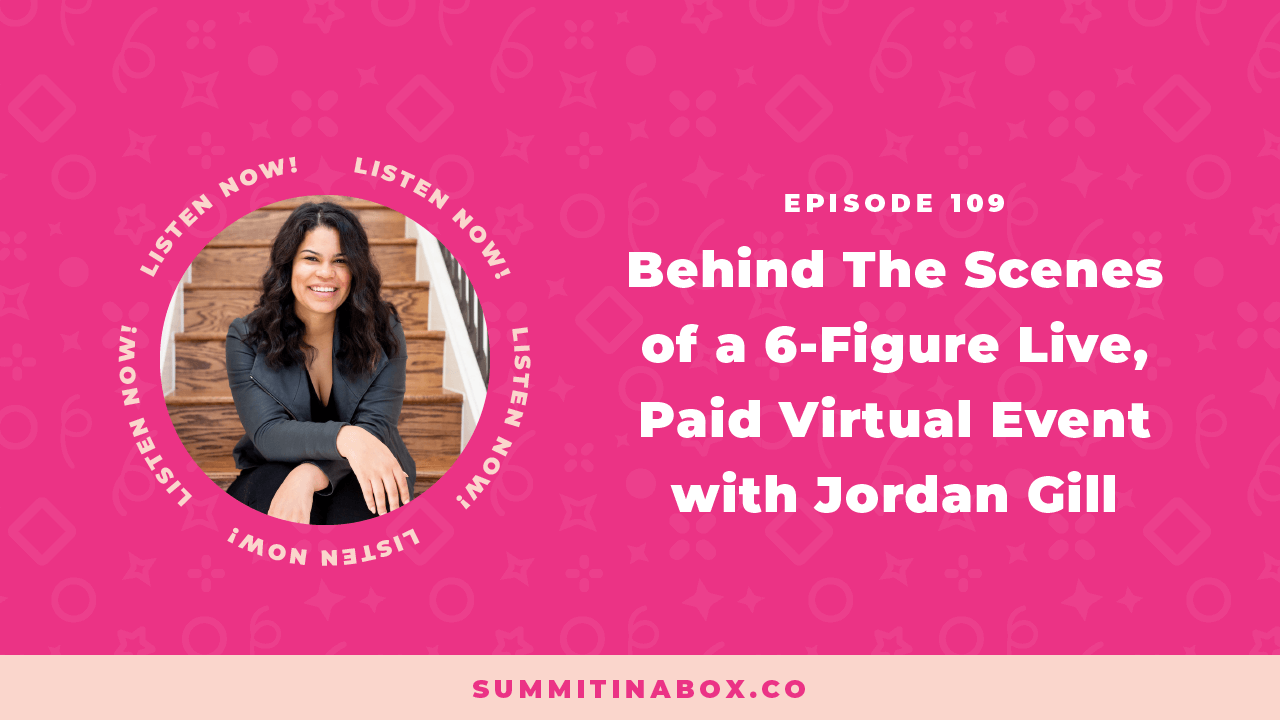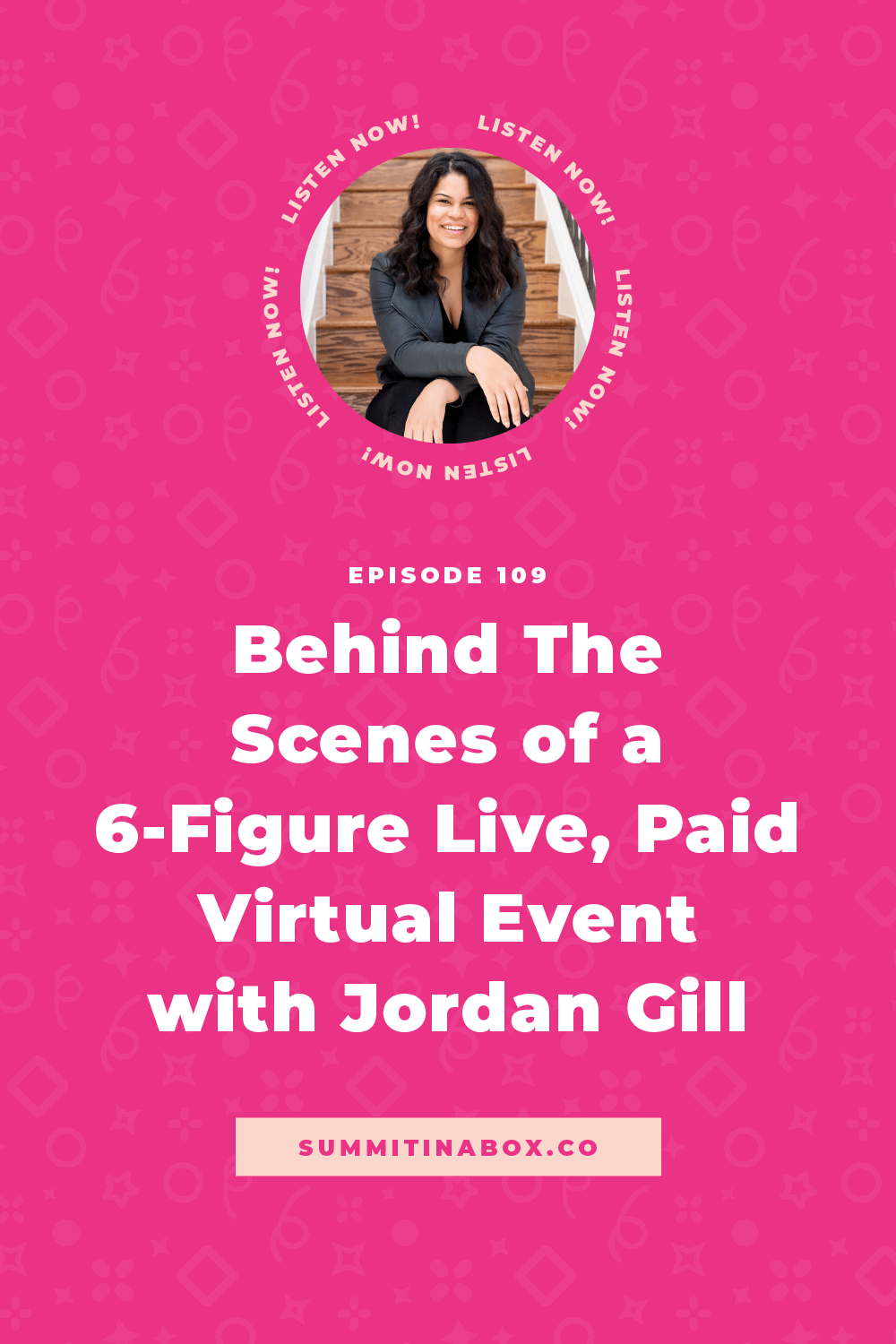Behind The Scenes of a 6-Figure Live, Paid Virtual Event with Jordan Gill


Thinking about hosting a live or paid virtual event?
Jordan Gill, host of the Done in a Day Interview Series is giving us a behind-the-scenes look at how she uses a live, paid virtual event to love on her people and bring new members into her group coaching program.
We'll cover:
- What makes Jordan's events different
- Why she runs live, paid events instead of pre-recorded or free
- A behind-the-scenes look at her results
- How to make a paid event successful
- How to make a live event run smoothly.
We'll let Jordan take it from here.
Behind the Scenes of a Live, Paid Virtual Event with Jordan Gill
We're coming up on our 3rd virtual conference and I love it. I've been to a lot of in-person events, but have never hosted one myself. With COVID, in-person gatherings are no longer an option, which is why I decided to try our run at virtual conferences and summits.
I'm totally obsessed!
Our event is very specific, which I think is key. It is for people who are interested in creating a virtual VIP day. We cannot continue to do these super general summits anymore. Audiences are not listening.
I really am excited to dive into all of the details of our event for our speakers, our affiliates, our audience members, and our team behind-the-scenes.
If you have not attended Jordan's Done In a Day interview series, you can grab your ticket for her next event here! It's absolutely incredible.
What Makes Jordan's Summits Different
A lot of the events you see happening these days are pre-recorded events that are free to attend. I do things a little differently in that:
- They are paid events, they are not free to attend
- The event is LIVE, there is no prerecording done.
Why Jordan Does Paid Events
I've realized that when people pay, they pay attention. Our first event was free and it was during the Black Lives Movement and everyone's focus was on what was going on with the nation. I found that when people choose to invest in something, like these summits, they will actually pay attention to the content.
I want people who are ready to dial in.
I want people who are serious about adding the opportunity we teach about into their offer suite or even make it their business model. Creating a paid event helps differentiate us in the marketplace and there aren't many people talking about VIP days.
Why Jordan Does Live Events
When I decided to run a live event my team thought I was insane. I thought it's going to be fun!
I think the live element was because I'm the kind of person that likes to engage with people when I'm speaking. I really wanted to create as close to a live event as possible because people haven't been able to go to live events. I know I’ve missed that!
Jordan’s Results
Our free event sold 1100 tickets, which was good. Then, our paid event sold 580.
Initially, it sounds like a trap. Why be excited to have half the leads?
I knew going into it that we were going to have less than we had previously. I was concerned with the trickle-down of conversion rates, but here's how it turned out:
- With the free summit, we had 7% of people upgrade to the $97 all-access pass.
- With the paid summit, we had 25% of people upgrade, and we kept it at $97.
Another difference between the two was that the free event had a thank you page and then a whole other sales page for the all-access pass. The paid event just had a toggle. We didn’t create a whole new page. You'd pay for your ticket and toggle over if you wanted the all-access pass. We eliminated a bunch of work on the sales page aspect, too.
Breaking Down the Numbers
Ticket and all-access pass sales broke down like this:
- Tickets were $19
- Total revenue just from tickets was $11, 020
- All-access pass sales $12,319
- Before we even started, we made $23,339
One thing that differed between the free and the paid, was our free did not have applications into our group coaching program and our paid one did. The reason for that is we like to qualify who’s in our program.
The group coaching numbers broke down like this:
- 170 applications
- 129 of the applications were qualified
- 32 total clients ended up joining
- 9 paid in full @ $4,000
- 12 paid monthly @ $750/month
We ended up with $17,250 cash in hand, and $86,250 expected revenue across the next 5 months with the monthly payments, just from the group coaching.
Total revenue collected from the event $162,839, coming from those 580 people.
Why Jordan's Paid Event Was Successful
There were a few key things that made our paid event run as well as it did.
1. With marketing, we leaned-in to what we're best at
Rather than trying all kinds of crazy marketing methods, we focused on what we're best at.
We do affiliates and JV partnerships really well, so we leaned on our affiliates and even our speakers, to some extent. We also gave our speakers and affiliates a free ticket to attend the full event.
As far as affiliates go:
- We had 64 affiliates
- 50% were active affiliates, with at least 1 click on their link
Side Note: Do not do affiliates (separate from speakers) for your first launch. It worked well for me because I've been doing affiliate stuff for years and I perfected my process around it. Focus on speakers and having them promote your event.
As for marketing as a whole:
- about 20 tickets come through our paid advertising (our Facebook ads totally flopped)
- 40% came from affiliates
- 60% came from our audience
2. We loved on our audience
I think also it came down to our main goal. Our whole goal is to love on people and create raving fans. It doesn't matter what that means in the moment.
For example, in the chat, we had paid event volunteers that we brought in to love on people, hype them up, and make sure they have what they need.
Part of the reason why people joined our program, was because the chat was so on fire, people said things like:
- “I don't want to leave this bubble."
- "I love everybody who's here. I've connected with so many people that are here and I really liked Jordan."
- "I want to join the program because I know that if I'm paying $19 and this is how much loving I get? I'm going to pay this much and go and experience it on an even deeper level.”
Making Live Events Run Smooth
Live events aren't for everyone and it takes careful planning to pull it off.
Because of that, we had quite the contingency document including details down to "if this person's internet is out, this is who's covering for them?" Everybody had their role.
With a live event, it is still incredibly important that it's inclusive. To help, I hired an accessibility expert, Erin from MablyQ.
I think one of the best decisions that we made overall for the event was having a live captioner. It was expensive, but I know this is the right decision.
Another big thing we did to ensure the event went smoothly was prepare our speakers.
We did had a virtual speaker green room. It allowed for us to have speakers come to meet each other, hang out for 15 minutes before they came to the main stage, and give the feeling of a live event.
We also did speaker tech checks before the event. I don't want the headphones wrestling for our deaf and hard of hearing folks. That's like the worst experience possible.
Jordan’s Biggest Takeaway
Summits are the best and quickest way for people to get to know you. I truly believe that. It’s important to create that experience for your audience and for your people because it's unlike anything else. Events and summits are not going anywhere.
Absolutely be specific with your topics.
I want to encourage you that events and summits are not something that's going away, something that people are tired of.
You're in the right place. You're learning from the right person. This is a marketing area that you're going to want to pay attention to, or at least try.
Action Steps
- Get intentional with your audience.
- Have a system in place.
- Love on your people!
Now go out and take action to plan, strategize, and launch your profitable online summit.
About Jordan
 Jordan Gill, Operations Consultant and founder of Systems Saved Me, helps overworked one-woman shows become streamlined solopreneurs. Her jam is creating a cohesive operating system for managing your tasks, files, and inbox. She’s been on podcasts like What Works and CEO Vibes sharing her love of replacing monthly retainers with one-day virtual intensives. She currently lives in Dallas, TX with her Cavapoo, Vivienne, and collection of 1,000 piece jigsaw puzzles.
Jordan Gill, Operations Consultant and founder of Systems Saved Me, helps overworked one-woman shows become streamlined solopreneurs. Her jam is creating a cohesive operating system for managing your tasks, files, and inbox. She’s been on podcasts like What Works and CEO Vibes sharing her love of replacing monthly retainers with one-day virtual intensives. She currently lives in Dallas, TX with her Cavapoo, Vivienne, and collection of 1,000 piece jigsaw puzzles.
Systems Saved Me | Instagram | Join the Next Virtual Conference!
Resources
- Erin Perkins - MabelyQ
- Episode 4: Discover Your Ideal Virtual Summit Audience
- Episode 5: Choose a Profitable Virtual Summit Topic
- Episode 84: Create Raving Fans & Dream Customers Through a Virtual Summit
- Summit Host Hangout Facebook group
Pin it for later!



Free Training Series: Summit to Sales
Learn how virtual summits can become your most effective lead generation strategy, cash injection method, and lead to a long-term, reliable increase in sales of your signature offer.

